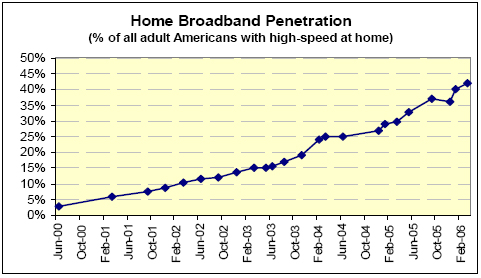
August 25 2024
The biggest consumer internet companies have been started in the wake of technological unlocks.

The better part of the 2010s was mostly unkind to consumer internet companies. While there are several factors that discouraged consumer opportunities (e.g. Facebook withdrew APIs, turned cannibalistic on its partners, and then proved it could successfully fight off, copy, or acquire would-be threats….), the simplest explanation is that the 2010s lacked the kind of technological unlocks (crypto might be an exception) that motivated previous bursts of consumer opportunities.
It’s pretty clear that we have entered a new period of consumer opportunity–something reminiscent of 1994-1998, 2003-2007, and 2008-2012.
Where should we expect new breakthrough consumer apps? A few ideas:
The sunny side of automation is that services become very cheap. The dark side of automation is what happens to the humans whose labor made those services expensive.
Let’s consider the sunny side. At some level of AI capabilities – not far away! – I expect we will see products that look like synthetic experts.
These experts may resemble tutors, helping us learn new skills like cooking, language learning, high school physics, programming, chess. They may resemble trainers or coaches. Or therapists supporting our emotional needs….
In the last few years we’ve seen breakout companies for different forms of creative expression: Midjourney for images, Suno and Udio for music, Runway for video.
I suspect there are some creative domains which – while not yet consumer friendly – ultimately become consumer-friendly because AI lowers barriers to entry.
Software development–through tools like val.town, Cursor or websim–might be one of them. Fashion design, furniture design, game development, hardware design etc.. might be others. I’ve never designed my own furniture or built a video game, but I’d bet that at some point I will.
This post of mine from last year still rings true: https://pzakin.substack.com/p/creative-machines.
As I wrote about in https://www.peterzakin.com/beyond-the-web.html, I think the browser is going to become the main app we use to interact with an AI assistant.
The browser makes sense as an AI interface because it’s where users spend most of their time. Owning user attention is strategic. As AI assistance commodifies across providers, the winner is likely the one that has greatest proximity to user attention.
For that reason, I suspect the AI providers will partner with or acquire existing browsers. OpenAI already powers Copilot in Edge via their partnership with Microsoft but presumably has little control over that product experience… I continue to believe Arc is an alluring acquisition target for both OpenAI and Anthropic.
While it’s tempting to assume that incumbents will reap most AI rewards in a category like this, there are conditions that would give startups an advantage. I have described this as a sort of UX counterpositioning: building an AI browser might require radical UX changes and these changes might be things that incumbents are resistant to, particularly if they think that it will alienate an important segment of their user base.
An AI that sees the world through your eyes, which knows you better than any other person or software, is an alluring idea.
An AI that knows your preferences might communicate them to the software you use to achieve better personalization.
An AI that you confide in might make you feel less alone. It might simulate the care you’d otherwise seek out from other people.
An AI that knows you well and which observes your interactions might help you see past your blind spots. You might use it to seek out a better understanding of yourself. Or remember your past. Or figure out who you should date.
I like AI companions that work for you more than I like AI companions that replace the appearance (if not the reality) of the need for socialization.
Existence is lonely and hard and technology that brings comfort and joy should be encouraged. And yet, the convenience of AI relationships might make us less dependent on organic, human relationships. So much comes from making AI capable of simulating human-ness… but as a general principle to cling to in these weird (and exciting!) times: it is good to need other people.